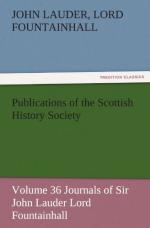LANGUAGE AND SPELLING
No alteration has been made on the text of the MSS. except the substitution of capital letters for small ones, where capitals would now be used. In this matter Lauder’s practice is capricious, and it may safely be said that it was governed by no rule, conscious or unconscious. He spells the pronoun I with a capital, and usually begins a sentence with one. But names of persons and places are very often spelt with small letters. The use of capitals was not yet fixed, as it is now, and the usage of different languages, such as English, French and German, as it came to be fixed, is not identical. Some changes in the punctuation have also been made in transcription for the sake of clearness, but the punctuation, which is scanty, has not been systematically altered. In the MSS. some single words have been erased, or rubbed off, at the top and the foot of the page. The blanks are indicated, and as a rule, but not quite invariably, explained in footnotes. MSS. X and H are printed entire, with two unimportant omissions, one in each, which are noted and explained, and as regards MS. H, with the exception of some detached pages of accounts, and a catalogue of some books. Of these it was thought that the Appendix contains enough. From MS. K only extracts are given. The remainder contains more accounts, and a further catalogue of books, without the prices, and other memoranda and reflections, now of no interest. The spelling is to a large extent arbitrary.[39] It is less regular than, for example, the contemporary Acts of Parliament, but more regular than the letters of some of Lauder’s contemporaries, in high positions.[40] A word is often spelt in different ways on the same page. There are, however, many constant peculiarities, some of which may have a linguistic interest, thus ‘laugh’ ‘rough’ ‘enough’ ‘through’ are spelt with a final t. The use of a final but silent t Mr. Mackay in his introduction to Pitscottie,[41] p. cxl, says is a distinct mark of Scots of the middle period. ‘Voyage,’ ‘sponge,’ and ‘large’ are sometimes spelt without the final e. ‘Knew,’ ‘slew,’ ‘blew’ are spelt ‘know,’ ‘slow,’ ‘blow.’ ‘Inn’ is spelt ‘innes.’ ‘See’ is always spelt ‘sy’ or ‘sie,’ and ‘weigh,’ ‘wy.’ But these are only examples, taken at random. ‘One,’ ‘off,’ ‘too,’ ‘thee’ are spelt ‘on,’ ‘of,’ ‘to,’ ‘the,’ a snare to the unwary reader. ‘V’ and ‘W’ are frequently interchanged.
[39] Lauder’s French
in the Journal in France is full of mistakes,
both
of grammar and spelling. He was only learning
the language.
[40] Cf. Bishop Dowden’s
introduction to Lauderdale Correspondence
(S.H.S.),
Miscellany, vol. i. p. 230.
[41] Historic and Chronicles
of Scotland, by Robert Lindesay of
Pitscottie
(Scottish Text Society, 1899).
Lauder’s language is idiomatic, and he uses many Scottish words which were not common in the written literary language of his time. A few of these words are now rare and even difficult to trace.[42] Most of them are quite intelligible to persons who have been accustomed to hear Lowland Scots spoken, but for the sake of other readers I have been convinced that occasionally interpretation is not superfluous.




